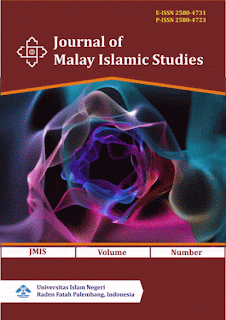TRACING THE CONCEPT OF POLITICAL LEADERSHIP OF ISLAM NUSANTARA
DOI:
https://doi.org/10.19109/jmis.v1i1.3791Keywords:
Political Leadership, Discourse, Tradition, JavaAbstract
Certain community both based ethnicities and nationalities have different characteristics on the notion of political leadership. Studies on the political leadership concept in Indonesia cannot escape from the Javanese political leadership characteristics. The reason is simply, because most of Indonesian leaders are from Java. Ben Anderson (1990) sees the Sukarno and Suharto leadership as the representation of Islamic Mataram Kingdom that was absolute and totalitarian typical leadership. Then, it follows cultural stereotyping of political leadership based on ethnicity in Indonesia. Jajat Burhanuddin (2014) sees that Melayu has democratic political culture, while Jawa has authoritarian political culture based on the creed “Manunggaling Kawula Gusti” –Unity between God-ruler or Subject-ruler. However Burhanuddin (2014) does not explain the nature of the creed in Javanese typical political leadership. Naim (2014) controversially sees that there are bipolar characteristics of political leadership in Indonesia. Jawa has absolute and totalitarian typical leadership that is influenced by Javanese local belief; otherwise Melayu (Outside Jawa) has egalitarian and democratic political leadership that is strong influenced by Islamic teaching. This paper tries to dig the understanding of principles on political leadership in Indonesia by making comparison both Jawa and Melayu on the nature of political leadership. The paper engages Talal Asad (2009) conceptual frameworks on discursive tradition. Thus from Asad point of view political leadership is the result of a dynamic process between agency and structure. That is a process of negotiation between the ruler and subjects in a certain structure.
References
Asad, Talal. 2009. “The Idea of An Anthropology of Islam.” Qui Parle 17(2): 30. http://www.jstor.org/stable/20685.
Burhanuddin, Jirat. 2001. “The Making of Islamic Political Tradition in Malay World.” Studi Islamika 8(2): 687.
Naim, Muctar. 2014. “Idealisasi Kepemimpinan Bangsa Sudut Antropologi Orang Melayu, Dulu Dan Sekarang.” In Paper Presented at International Seminar on Malay Civilization IAIN Raden Fatah, Palembang.
Ricklefs, M. 2008. History of Modern Indonesia Since. C.1200: Fourth Edition. California: Standfort University Press.
Downloads
Published
Issue
Section
License

Journal of Malay Islamic Studies is licensed under a Creative Commons Attribution-ShareAlike 4.0 International License.


